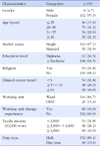Abstract
Purpose
This study was conducted to investigate the effects of ego-resilience and work environment on job satisfaction in psychiatric nurses.
Methods
The participants were 170 nurses from M, W, and S mental hospitals in J province. Data were collected from March 1 to April 30, 2015, and analyzed using SPSS/WIN 21.0.
Results
The mean score for ego-resilience was 36.7±4.25, for work environment, 30.9±3.57, and for job satisfaction, 56.86±6.88. Ego-resilience showed positive correlations with work environment (r=.195, p=.011) and job satisfaction (r=.252, p=.001). Work environment showed a positive correlation with job satisfaction (r=.513, p<.001). Significant factors that influenced job satisfaction were ego-resilience, work environment, marital status, religion and type of duty. These variables explained 33.4% of job satisfaction.
Figures and Tables
References
1. Bogaert PV, Heusden VD, Timmermans O, Franck E. Nurse work engagement impacts job outcome and nurse-assessed quality of care: model testing with nurse practice environment and nurse work characteristics as predictors. Front Psychol. 2014; 5:1261–1271. DOI: 10.3389/fpsyg.2014.01261.
2. Alsaraireh F, Quinn Griffin MT, Ziehm SR, Fitzpatrick JJ. Job satisfaction and turnover intention among jornadian nurses in psychiatric units. Int J Ment Health Nurs. 2014; 23(5):460–467. DOI: 10.1111/inm.12070.

3. Kim MJ, Kim SJ, Kim KB. Phenomenological approach on self-esteem of clinical nurses. J East West Nurs Res. 2013; 9(2):138–149.

4. Ma C, Olds DM, Dunton NE. Nurse work environment and quality of care by unit types: A cross sectional study. Int J Nurs Stud. 2015; 52(10):1565–1572. DOI: 10.1016/j.ijnurstu.2015.05.011.

5. Bogaert PV, Clarke S, Vermeyen K, Meulemans H, Van de Heyning P. Practice environments and their associations with nurse reported outcomes in Belgian hospitals: development and validation of a dutch adaptation of the revised nursing work index. Int J Nurs Stud. 2009; 46(1):54–64. DOI: 10.1016/j.ijnurstu.2008.07.009.
6. Rosseberg JI, Friis S. Patient and staff's perceptions of the psychiatric ward environment. Psychiatr Serv. 2004; 55(7):798–803. DOI: 10.1176/appi.ps.55.7.798.
7. Jackson D, Firtko A, Edenborough M. Personal resilience as a strategy for surviving and thriving in the face of workplace adversity: a literature review. J Adv Nurs. 2007; 60(1):1–9. DOI: 10.1111/j.1365-2648.2007.04412.x.

8. Block J, Kremen AM. IQ and ego-resiliency: conceptual and empirical connection and separateness. J Pers Soc Psychol. 1996; 70(2):349–361.

9. Hudgins TA. Resilience, job satisfaction and anticipated turnover in nurse leaders. J Nurs Manag. 2015; Forthcoming. DOI: 10.1111/jonm.12289.

10. Park SH. The factors related to psychiatric nurses' turnover intention [master's thesis]. [Daegu]: Kyungpook National University;2012.
11. Kim BN, Oh HS, Park YS. A study of nurses' resilience, occupational stress and satisfaction. Korean J Occup Health Nurs. 2011; 20(1):14–23.

12. Bong YS, So HS, You HS. A study on the relationship between job stress, self-efficacy and job satisfaction in nurses. J Korean Acad Nurs Adm. 2009; 15(3):425–433.
13. Kim KB, Sok SH. A Study of Job Satisfaction of the nurses in a university hospital. J East West Nurs Res. 2006; 12(1):14–24.
14. Lee BS, Kang SR, Kim HO. Experience of job satisfaction in clinical nurses: application of focus group methodology. J Korean Acad Nurs Adm. 2007; 37(1):114–124.

15. Kim EJ, Lee JK. The effects of organizational culture and self-leadership on organizational effectiveness. J Korean Soc Dent Hyg. 2010; 33:81–101.
16. Castaneda GA, Scanlan JM. Job satisfaction in nursing: A concept analysis. Nurs Forum. 2014; 49(2):130–138. DOI: 10.1111/nuf.12056.

17. Kwon KJ, Chu MS, Kwon JA, Kim JA. The impact of work environment and mood state on job satisfaction among nurses of psychiatric wards. J Korean Soc Living Environ Syst. 2009; 16(3):323–332.
18. Faul F, Erdfelder E, Lang AG, Buchner A. G*power 3.: A flexible statistical power analysis for the social, behavioral, and biomedical sciences. Behav Res Methods. 2007; 39(2):175–191.

19. Yoo SK, Shim HW. Psychological protective factors in resilient adolescents in Korea. Korean J Educ Psychol. 2002; 16:189–206.

20. Minjungseorim. Essence Korean dictionary. 6th ed. Paju: Minjungseorim;2014.
21. Friis S. From enthusiasm to resignation in therapeutic community: a process evaluation of mental hospital ward with the ward atmosphere scale (WAS). J Oslo City Hosp. 1981; 31:51–54.
22. Weiss DJ, Dawis RV, England GW, Lofguist LH. Manual for the minnesota satisfaction questionnaire. Minneapolis, MN: University of Minnesota;1967.
23. Yun JS. A study of violence experience from patients and their families and job satisfaction of emergency department nurses [master's thesis]. [Ulsan]: University of Ulsan;2004.
24. Kwon JA. Clinical nurses' working environment and intention of retention [master's thesis]. [Seoul]: Hanyang University;2009.
25. Committee on the Robert Wood Johnson Foundation Initiative on the Future of Nursing at the Institute of Medicine. The future of nursing: leading change, advancing health. Washington DC: National Academies;2011.
26. Lacey SR, Teasley SL, Cox KS, Olney A, Kramer M, Schmalenberg C. Development and testing of an organizational job satisfaction tool: Increasing precision for strategic improvement. J Nurs Adm. 2011; 41(1):15–22. DOI: 10.1097/NNA.0b013e3182002871.
27. Kim SH, Lee MA. Effects of emotional labor and communication competence on turnover intention in nurses. J Korean Acad Nurs Adm. 2014; 20(3):333–342. DOI: 10.11111/jkana.2014.20.3.332.

28. Ritter D. The relationship between healthy work environments and retention of nurses in a hospital setting. J Nurs Manag. 2011; 19(1):27–32. DOI: 10.1111/j.1365-2834.2010.01183.x.

29. Lin YR, Chiah IS, Chang YC, Lai TJ, Wang KY, Chou KR. Evaluation of an assertiveness training program on nursing and medical students, assertiveness, self-esteem, and interpersonal communication satisfaction. Nurse Educ Today. 2004; 24(8):656–665. DOI: 10.1016/j.nedt.2004.09.004.

30. Lim JY. An analysis of internal marketing activities affecting on nurse's motivation: based on herzberg's motivation-hygiene factor theory. J Korean Acad Nurs Adm. 2006; 2(1):5–13.




 PDF
PDF ePub
ePub Citation
Citation Print
Print







 XML Download
XML Download